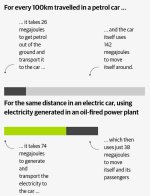How are batteries incredibly efficient ? 300kg of batteries are needed to cover the distance of 40kg of fuel. And that’s ignoring motor vs ICE efficiency.
A typical battery is 0.3MJ/kg. Petrol 44MJ
You are confusing efficiency and total potential energy and potential energy per kilo. They are all very different things. Yes petrol has way more potential energy per kilo but creating it and using it is incredibly inefficient. You lose huge amounts of that potential energy through the extraction, refining, transportation and combustion of that fuel.
Think of it this way, 1 US gallon of fuel has approximately 33kWh of energy and gets the average american car 35 miles. 33kw in an electric car will go over 130 miles in something like a Kona, Ionic or Model 3 and over 100 miles in something like a Model S. This also completely ignores the extraction, refining, transportation and combustion of that fuel. Electricity generation and battery charging is considerably more efficient than producing petrol.
https://cleantechnica.com/2018/03/10/electric-car-myth-buster-efficiency/


